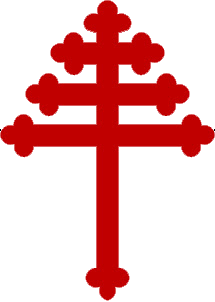Btoulto Yeldat Doumoro البتول ولدت عجبًا
ܒܬܽܘܠܬܳܐ ܝܶܠܕܰܬ̣݀ ܕܽܘܡܳܪܳܐ
ألبتولُ ولدَتْ عجَبًا The Virgin has given birth to a wonder La Vierge a donné naissance à une merveille Btoulto Yeldat Doumoroܬ̣ܰܘ ܢܺܐܙܰܠ̣ ܢܶܬܒܰܩ̣ܶܐ ܒܶܗ
تعالَوا نذهَبْ ونتأمَّلْ Come, let us go and contemplate Venez, allons contempler Taw nezal netbaqea behܒܩܰܫܺܝܫ ܡܶܢ ܕܳܪ̈ܶܐ ܕܰܒܥܰܙܪܽܘܪ̈ܶܐ ܟܪܺܝܟ
بمَن هو أقدَمُ من الأجيالِ ملفوفًا بالأقمِطَة The Ancient of Days, who is older than the generations, swaddled in cloth L’Ancien des jours, plus vieux que les générations, enveloppé dans un linge Bqashish men darei dabazrorae krikܣܳܒܳܐ ܥܰܬܺܝܩ ܝܰܘ̈ܡܳܬܳܐ ܕܺܝܠ̣ܶܕܬܶܗ ܒܬܽܘܠܬܳܐ
ألشيخُ القديمُ الأيّامِ الّذي ولَدَتْهُ البتول The eternal Elder, whose mother is the Virgin L’Ancêtre éternel, dont la mère est la Vierge Sawo atiq yawmata diyaldteh btoultoܓܰܢ̱ܒܳܪܳܐ ܕܰܬܩ̣ܰܠ ܛܽܘܪ̈ܶܐ ܕܙܰܝܰܚ̣ܬܶܗ ܥܠܺܝܡܬܳܐ
ألقديرُ الّذي وزنَ الجبالَ وقد زَيَّحَتهُ الصبيَّة The Mighty, who weighed the mountains yet was upheld by a maid Le Tout-Puissant, qui a pesé les montagnes mais soutenu par une jeune fille Ganbaro dataqal tturè dziyachtheh alaymtoܗܰܘ̇ ܕܝܳ݀ܗܶܒ ܠܰܚܡܳܐ ܠܟܰܦ̈ܢܶܐ
ألواهِبُ الخبزَ للجائعينَ He who gives bread to the hungry Celui qui donne le pain aux affamés Haw diyahib lakhmo lafkaneܝ̣ܺܢܶܩ ܚܰܠܒܳܐ ܐܰܝܟ ܫܰܒܪܳܐ
رضِعَ الحليبَ كطفلٍ He suckled milk like a child Il a tété le lait comme un enfant Yeniq chalbo aik shabroܒܪܳܐ ܕܠܰܝܬ ܗ̱ܘ̣ܳܐ ܠܶܗ ܫܽܘܪܳܝܳܐ
ألابنُ الّذي لا بدءَ له The Son who has no beginning Le Fils qui n’a pas de commencement Bra dlayt huwa leh shourayoܨܒ̣ܳܐ ܘܰܗܘ̣ܳܐ ܠܶܗ ܫܽܘܪܳܝܳܐ
شاءَ فصار له بدءٌ He willed and thus had a beginning Il a voulu et ainsi eut un commencement Tsawa wahuwa leh shourayoܘܶܐܬ̣ܳܐ ܠܡܰܘܠܳܕܳܐ ܘܫܽܘܠܳܡܳܐ ܠܰܝܬ ܠܶܗ
وِاتُا لْمَوْلُدُا وْشُوْلُمُا لَيْتْ لِهْ He came to the birth, and no end was there for Him Il vint à la naissance, et il n’y avait point de fin pour Lui Weata lmaulada wshoulama layt leh